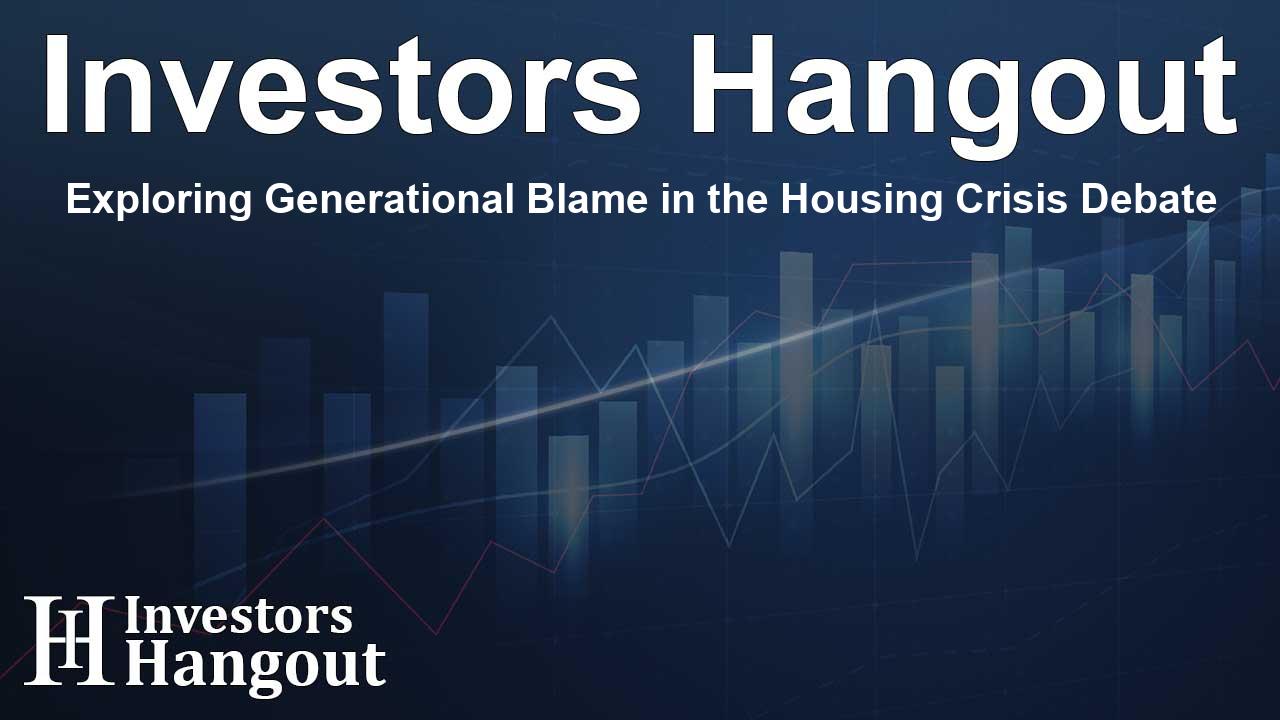Exploring Generational Blame in the Housing Crisis Debate

Understanding the Generational Divide on Homeownership
Homeownership is often viewed as a cornerstone of the American dream, surpassing the importance of love, retirement, or even raising a family. However, recent findings reveal that generational perspectives on homeownership and the housing crisis are strikingly divergent.
Who Do We Blame for the Housing Crisis?
A new survey indicates that nearly one-third of Americans attribute the current affordable housing crisis to Millennials, who are seen as the primary culprits by 31% of respondents. In comparison, Boomers follow closely behind at 27%. This blame game highlights the complex relationship between these generations over housing issues.
Interestingly, Millennials perceiving the situation report an opposing viewpoint, with 35% identifying Boomers as the most responsible generation. This generational tension hints at a deeper discord about the root causes of the crisis.
Political Opinions and Their Impact
Recent survey results also indicate that a significant majority of Millennials (61%) cast blame on the policies of the previous administration for the housing situation. This is a notable contrast to only 50% of Boomers sharing similar sentiments. The rift in perceptions reveals not only differing generations but varying approaches toward government involvement and policy facilitation in the housing market.
The Role of Economic Factors
As both generations reflect on the housing crisis, economic elements cannot be ignored. Inflation is a crucial concern here, with 93% of Boomers and 91% of Millennials pointing to it as a significant factor in the inability to secure affordable housing. Furthermore, high-interest rate environments exacerbate these challenges, with 91% of Boomers and 89% of Millennials acknowledging its detrimental effect.
Willingness to Compromise on Taxes
Despite the consensus on the housing crisis, opinions diverge sharply when it comes to solutions. Alarmingly, only 21% of Boomers are willing to embrace higher taxes as a remedy for the affordable housing crisis, compared to 39% of Millennials who are more inclined to support such measures. This difference reflects broader generational attitudes towards government action and economic responsibility.
HOPE Among Renters
Diving deeper into personal aspirations highlights that even amid these challenging times, Millennials exhibit optimism about homeownership. Approximately 60% of Millennial renters hold onto the hope of owning a home, a notable contrast to the 38% of Boomers who feel similarly. This disparity suggests that while the stakes seem high, younger generations remain eager to pursue homeownership.
When it comes to aspirations, 84% of Millennial renters dream of owning a home one day, with 52% stating that homeownership is their primary goal — compared to only 52% and 27% of Boomers respectively. This ambition injects a dynamic element into the discussion around homeownership challenges.
Current Financial Struggles in the Housing Market
Despite these aspirations, a troubling reality persists: 71% of renters feel they currently cannot afford to contribute toward a down payment for a home. Particularly notable is the plight of Generation X, with 47% indicating they invest over half their income into housing costs, marking them as significantly burdened by housing expenses.
A staggering 77% of Americans agree that homeownership is currently out of reach. Nevertheless, a powerful majority still regard it as essential to the American identity, ranking it just below valued rights such as freedom of speech and equitable healthcare.
Conclusion: Navigating a Path Forward
As we analyze these generational perspectives on homeownership amidst the housing crisis, it is essential to recognize the varied opinions contributing to the dialogue. It’s clear that both Millennials and Boomers have valid perspectives shaped by their unique experiences. Going forward, dialogue and collaboration among generations may be crucial in developing effective solutions that address the ongoing housing challenge.
Frequently Asked Questions
What do Americans think about homeownership versus jobs?
Most Americans believe that owning a home is more significant than having a job they love, retirement, or children.
Which generation is held responsible for the housing crisis?
Many Americans blame Millennials for the affordable housing crisis, while Millennials, in turn, often blame Boomers.
How do Boomers and Millennials differ in handling housing issues?
Millennials tend to support more government policies for housing affordability compared to Boomers.
Are renters optimistic about homeownership?
Yes, 60% of Millennial renters express a positive outlook on their future homeownership opportunities.
What financial burdens do renters face?
Many renters indicate they cannot afford to save for a down payment, contributing to the ongoing housing affordability crisis.
About The Author
Contact Thomas Cooper privately here. Or send an email with ATTN: Thomas Cooper as the subject to contact@investorshangout.com.
About Investors Hangout
Investors Hangout is a leading online stock forum for financial discussion and learning, offering a wide range of free tools and resources. It draws in traders of all levels, who exchange market knowledge, investigate trading tactics, and keep an eye on industry developments in real time. Featuring financial articles, stock message boards, quotes, charts, company profiles, and live news updates. Through cooperative learning and a wealth of informational resources, it helps users from novices creating their first portfolios to experts honing their techniques. Join Investors Hangout today: https://investorshangout.com/
The content of this article is based on factual, publicly available information and does not represent legal, financial, or investment advice. Investors Hangout does not offer financial advice, and the author is not a licensed financial advisor. Consult a qualified advisor before making any financial or investment decisions based on this article. This article should not be considered advice to purchase, sell, or hold any securities or other investments. If any of the material provided here is inaccurate, please contact us for corrections.
